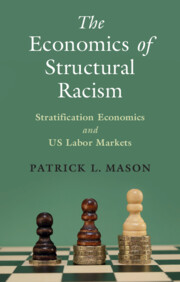Book contents
- The Economics of Structural Racism
- Cambridge Studies in Stratification Economics: Economics and Social Identity
- The Economics of Structural Racism
- Copyright page
- Dedication
- Contents
- Figures
- Tables
- Part I Foundations
- Part II African American Educational Progress and Transformations in Family Structure, 1965–Present
- Part III African American Income and Wealth, 1965–Present
- Part IV Structural Racism, 1965–Present
- 11 Structural Racism and Persistent Disparity
- 12 The Criminal Legal System and Hate Crimes
- Part V Restatement and Discussion
- References
- Index
11 - Structural Racism and Persistent Disparity
from Part IV - Structural Racism, 1965–Present
Published online by Cambridge University Press: 06 April 2023
- The Economics of Structural Racism
- Cambridge Studies in Stratification Economics: Economics and Social Identity
- The Economics of Structural Racism
- Copyright page
- Dedication
- Contents
- Figures
- Tables
- Part I Foundations
- Part II African American Educational Progress and Transformations in Family Structure, 1965–Present
- Part III African American Income and Wealth, 1965–Present
- Part IV Structural Racism, 1965–Present
- 11 Structural Racism and Persistent Disparity
- 12 The Criminal Legal System and Hate Crimes
- Part V Restatement and Discussion
- References
- Index
Summary
Experimental data, observational data, and analyses using automatic association data show that the manager–worker racial identity match influences hiring, pay, and access to managerial resources. Explanations of racial inequality in labor market outcomes depend on the wage–productivity relationship. The manager–worker racial identity match may affect productivity and wages in two ways: managers may use higher pay and better promotion opportunities to raises the productivity and wages of own-group workers; and, managers provide time, assistance, or other resources to own group workers and thereby increase their productivity, employment stability, and opportunities for promotion. Stratification economists link persistent discrimination to job competition. Equally skilled workers may receive different pay for doing the same work because they are employed at firms that are differentiated by the capacity to pay and by the capacity of workers to make firms pay. Equally skilled workers who perform the same job at firms with less competitive characteristics, or who are part of a workforce with lower bargaining power, will receive lower pay.
Keywords
- Type
- Chapter
- Information
- The Economics of Structural RacismStratification Economics and US Labor Markets, pp. 285 - 311Publisher: Cambridge University PressPrint publication year: 2023

